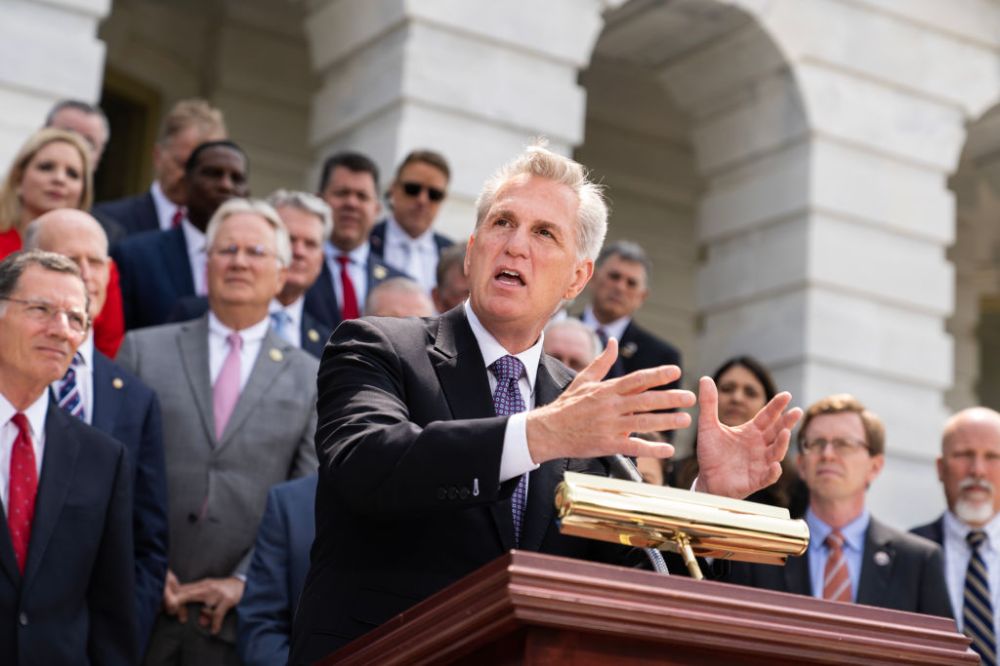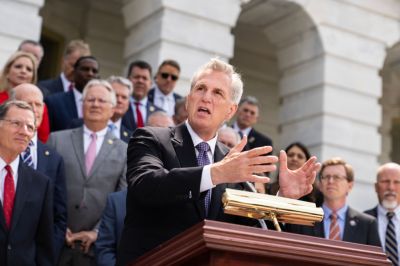Far-right Republicans and progressive Democrats are separately growing anxious about a potential debt ceiling deal between House Speaker Kevin McCarthy and President Joe Biden.
Frustration on the fringes is an almost inevitable phase of any genuinely bipartisan talks in Congress, and it could mean a deal is imminent—but the pushback presents new hurdles for party leaders as they face a default deadline as soon as June 1. To pass a deal, the Biden administration may have to prevent a revolt among Democrats over any concessions they make to Republicans. And if GOP leaders can’t placate their own members, dissent within the conference could threaten McCarthy’s leadership position and throw the House into chaos.
Staff and officials spent the week hammering out the details of a plan, aiming to complete a deal this weekend. McCarthy on Thursday made his most optimistic remarks yet about the odds of reaching an agreement, a sharp turn from his assessment earlier this week that the two sides were far apart.
“I see the path,” McCarthy told reporters of a potential deal, adding that the talks were professional and everyone involved was working hard.
Just hours later, the conservative House Freedom Caucus called on McCarthy to halt the negotiations.
The talks shouldn’t continue, they argued, until the Democratic Senate passes the partisan debt ceiling bill House Republicans approved last month. That legislation, which was packed with GOP priorities, clearly doesn’t have enough support to pass the Senate. It has been primarily viewed by top Republicans as a way to jumpstart talks with the president, who was reluctant to negotiate over the debt limit at all.
Angst on the right isn’t a surprise; conservatives warned the day it passed that they wouldn’t support anything weaker than the GOP bill. The debt limit standoff is one of the few points of leverage House Republicans will have in this Congress to see their priorities into law. They want to win as many concessions from Democrats as possible. But give-and-take is a reality of divided government. House Rules Committee Chairman Tom Cole acknowledged that earlier this year, when he told The Dispatch a final debt ceiling bill would probably lose support from the far-right and progressives.
“We’re not going to have a deal if the president of the United States doesn’t sign it. We’re not going to have a deal if a majority of the House doesn’t support it,” Cole said early last month. “So each side’s not going to just simply give the other side what it wants. It’s Politics 101.”
A lot hinges on whether the Freedom Caucus is willing to oppose the deal, if and when it emerges, without taking their frustrations out on McCarthy. With only a handful of members to spare, McCarthy is vulnerable to an ouster by his right flank.
Conservative activists are raising alarms, adding outside pressure to the talks. Russ Vought, former director of the Trump administration’s Office of Management and Budget, wrote Thursday that a less ambitious deal that doesn’t retain the House GOP’s planned $150 billion cut in discretionary spending for the upcoming fiscal year is unacceptable.
It’s not clear what an agreement might ultimately look like—and there’s an important caveat to include here that the deal-in-waiting could collapse entirely and talks could break down, who knows—but negotiators appear to be coalescing behind some kind of caps on government spending, clawing back billions of dollars in unspent coronavirus aid, and potentially some language streamlining permitting processes for energy projects.
Republicans also want to expand work requirements for social safety net programs. McCarthy has called work requirements an essential component for him, while Biden has rejected most of the requirements that were included in the GOP bill, especially for Medicaid. A compromise could be stricter rules for states to obtain grants for the Temporary Assistance for Needy Families program.
Democratic lawmakers are pushing back on any kind of expanded work requirements, with some raising concerns that the White House could be willing to cave to Republicans on the issue.
As the talks grew more serious this week, a group of progressive senators urged Biden to prepare to invoke the 14th Amendment, which states that “the validity of the public debt, authorized by law” shall not be questioned, to unilaterally deal with the debt ceiling.
“Republicans have made it clear that they are prepared to hold our entire economy hostage unless you accede to their demands to reduce the deficit on the backs of working families,” the senators wrote. “That is simply unacceptable.”
It’s an untested move that bears economic and legal risk.
In that scenario, Sen. Elizabeth Warren told The Dispatch, the Treasury Department “continues to pay Social Security recipients and bond holders without any pause. In other words, it looks like business as usual.”
But uncertainty over legal challenges that would follow could lead to higher interest rates for government debt and panic in financial markets.
“None of these are Plan A options,” Warren said. “The 14th Amendment is break-glass-in-case-the-hostage-takers-can’t-be-mollified.”
Democratic senators are largely waiting to see the details before drawing red lines about their support for a potential deal.
“I wouldn’t say I’m open to it,” Sen. Brian Schatz said of expanded work requirements for TANF. “I’ll just say it’s a weird position for the speaker to maintain, which is now, ‘If we don’t get work requirements for Temporary Assistance for Needy Families, we’ll take the country to default.’”
“It’s wild to me that this is treated like some sort of normal run-of-the-mill negotiation,” he added.
But he’s taking the GOP demands seriously: “Based on their behavior over the last couple of years, we should assume that whatever crazy thing they are saying, they are willing to do,” Schatz said. “I mean, most of them voted to overturn the election results. So I do not think they are play-acting as though they are nuts. I think they are genuinely nuts.”






Please note that we at The Dispatch hold ourselves, our work, and our commenters to a higher standard than other places on the internet. We welcome comments that foster genuine debate or discussion—including comments critical of us or our work—but responses that include ad hominem attacks on fellow Dispatch members or are intended to stoke fear and anger may be moderated.
With your membership, you only have the ability to comment on The Morning Dispatch articles. Consider upgrading to join the conversation everywhere.